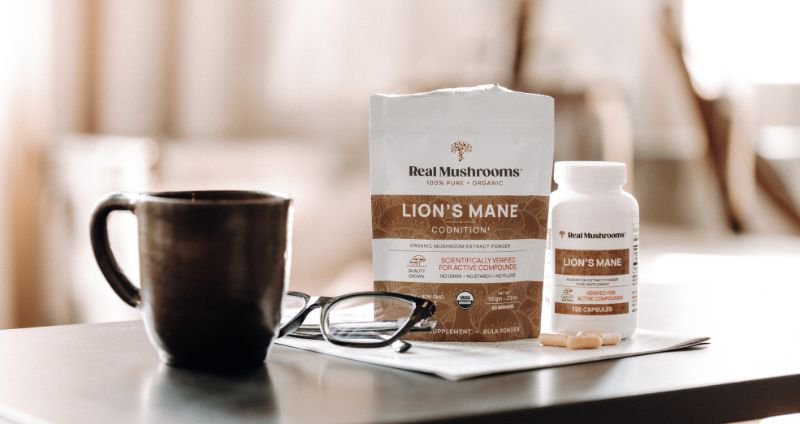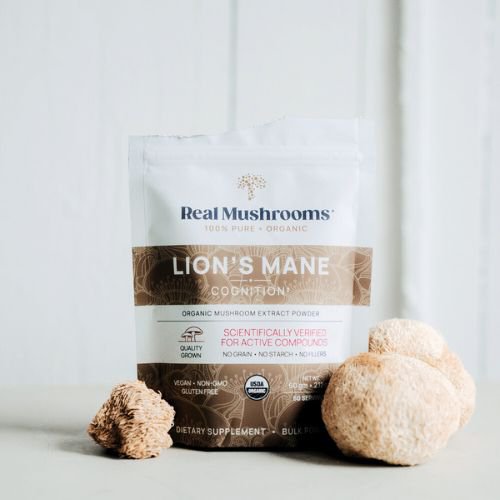Menu



Welcome to our comprehensive Lion's Mane (Hericium erinaceus) dosage guide. This natural health supplement is gaining popularity for its numerous health benefits. Whether you’re taking the real mushroom or using Lion’s Mane extract as a supplement, this guide will help you take it safely and effectively.
Lion's Mane mushrooms are known for their unique appearance and powerful medicinal properties. They've been used in traditional medicine for centuries, especially in Eastern culture.
Modern science is now catching up, revealing the potential of medicinal mushrooms such as Lion’s Mane to support brain health, improve cognitive function, boost the immune system, and promote overall well-being.
At Real Mushrooms, we’re committed to providing you with the highest quality, most trustworthy mushroom supplements. This guide will help you determine the right dose for our Lion's Mane extracts.

When using Lion’s Mane extract from Real Mushrooms, our recommended dosage is 1 gram of powder extract daily for the average person.
However, this dosage can vary depending on many factors, such as the reason for which you’re taking the supplement, your body weight, and how sensitive you are to the supplement.
Jeff and Skye discuss these and many other factors relating to taking medicinal mushroom supplements in the video below.
The recommended dosage of Lion's Mane mushrooms can also vary depending on the form you're using (such as fresh mushrooms, dried powder, or extract supplements) and your specific health goals.
Here are some general guidelines:
Secondly, the dosage can also depend on the specific reason you’re taking lion’s mane.
For general health and wellness, a lower dosage might be sufficient. However, a higher dosage is more effective if you’re using Lion's Mane for cognitive enhancement or to support nerve health.
Below is a helpful table with general guidelines for lion’s mane dosages when using an extract.

*These are just general guidelines. Everyone’s body is unique, and what works best for one person might not work as well for another.
When choosing Lion's Mane extract, quality matters. Real Mushrooms' Lion's Mane supplements are made from 100% organic mushrooms, with no fillers or additives. This ensures that you’re getting the highest concentration of active ingredients, for the most effective results.
Keep in mind that consistency is key when it comes to seeing the benefits of Lion's Mane. Make sure to take your supplement regularly, and give it some time to work. That’s because the benefits of Lion's Mane are cumulative, meaning they build up over time.
Determining the right dosage of Lion's Mane for you is crucial in reaping its health benefits.
While there are general dosage guidelines, it’s important to remember that everyone’s body is unique and may respond differently to supplements. Here are some key points to consider:
Our products are made from 100% mushroom (fruiting bodies), offering maximum health benefits. But, even though mushrooms are completely organic, be careful with the dosage, especially if you’re allergic to the active ingredients.
Finding the right dosage might take some time and experimentation. Start small, be patient, and make adjustments as needed. With the right approach, Lion's Mane can be a valuable addition to your wellness routine.
Action: Before starting any new supplement regimen, consult a healthcare provider or an expert in traditional and herbal medicines. They can provide personalized advice based on your individual health needs and circumstances.
Lion's Mane is generally considered safe for most people, but like any supplement, it can cause side effects in some individuals.
Here are some potential side effects you should be aware of:
Some people may experience digestive upset, including nausea, bloating, constipation or diarrhea, particularly when first taking Lion's Mane.
These effects are usually mild and tend to resolve as your body adjusts to the supplement. If these symptoms persist, reduce your dosage or consult a healthcare provider.
Although rare, some individuals may have an allergic reaction to Lion's Mane. Symptoms can include itching, rashes, difficulty breathing, or swelling of the face, lips, tongue, or throat.
If you experience any of these symptoms, stop taking Lion's Mane immediately and seek medical attention.
Lion's Mane may lower blood sugar levels, which can be a problem for people with diabetes or hypoglycemia.
If you have a condition affecting your blood sugar, monitor your levels closely when starting Lion's Mane and consult your healthcare provider.
Lion's Mane may interact with certain medications, including those for diabetes and anticoagulants.
If you’re taking any conventional medications, talk to your healthcare provider before starting Lion’s Mane consumption.

When you buy Lion’s Mane from Real Mushrooms, you’re guaranteed the purest, organic mushroom supplements. Grown in the mountainous wilds of China with clean water and clean mountain air, our Lion's Mane products are free of contaminants and pollutants.
Plus, all our Lion’s Mane medicinal mushroom products are derived from 100% organic mushrooms with no fillers or additives. We even test for heavy metals, pesticides, and microbiological activity, while also checking that our products have the bioactive compounds you need for a healthy lifestyle.
With Real Mushrooms, you get the most beneficial compounds for improving brain function, cognitive functions, stress reduction, and other benefits of Lion’s Mane supplements.
If you have any concerns about side effects or interactions, don’t hesitate to reach out to us or consult with a healthcare provider.
When it comes to natural health supplements like Lion's Mane, it’s essential to understand the concept of dosage and the potential risks of taking too much.
While Lion's Mane is generally considered safe and non-toxic, it’s wise to stick to the recommended dosage, unless otherwise directed by your healthcare professional.
So, can you overdose on Lion's Mane? Technically, it’s unlikely. Lion's Mane is a natural supplement, and there are no known cases of severe toxicity or overdose.
However, taking more than the recommended amount can lead to some discomfort or side effects.
If you accidentally take more than the suggested dosage, you might experience symptoms like an upset stomach, feelings of fullness, constipation, or diarrhea. These are not signs of an overdose as such, but rather your body’s way of telling you that you’ve had a bit too much.
Here’s what you should do if you think you’ve taken too much Lion's Mane:
Yes! Lion's Mane has been used for centuries in traditional medicine, particularly in Asia, and as a food. It’s known for its properties that support healthy cognitive function, support nervous system health, and help maintain a healthy inflammation response
The good news is that Lion's Mane is generally considered safe for daily consumption. It’s a natural product, and unlike synthetic drugs, it doesn’t have a long list of side effects.
However, as with any supplement, it’s always a good idea to listen to your body and observe how it reacts to the supplement.
Did You Know? A study involving menopausal women found that consuming cookies containing Lion’s Mane mushroom powder alleviated symptoms such as depression, anxiety, frustration, and heart palpitations. The findings suggest that incorporating Lion’s Mane at 2 grams per day into the diet can potentially reduce depression and anxiety within four weeks.

Yes, within limits. While Lion's Mane is a natural supplement, it doesn’t mean it can’t interact with other substances you’re taking. Here’s what you need to know:
Lion's Mane is often taken in conjunction with other natural health supplements, such as turmeric, bacopa, ginkgo biloba, omega-3 fatty acids, and ashwagandha, which may synergize to enhance overall cognitive function, support a healthy inflammation response, and support healthy neurological function.
These effects are also associated with nerve growth factor (NGF) stimulation, which can have a positive synergistic effect when used with Lion’s Mane dietary supplementation.
If you’re on any medication, it’s crucial to consult with your healthcare provider before starting Lion's Mane.
While there’s no widespread evidence of Lion's Mane causing adverse reactions with specific medications, it’s always better to be safe. Your healthcare provider can give you personalized advice based on your health history and current medications.
This is especially true if you’re taking medication for:
Inform your healthcare provider before using Lion’s Mane mushrooms with any conventional medication. Even if you’re not on any medication, it’s still a good idea to let your healthcare provider know you’re taking Lion's Mane.
They can monitor your progress and help you adjust your dosage if necessary. Plus, they’ll have a complete picture of your health regimen, which is always beneficial.

The benefits of taking Lion's Mane, such as enhanced overall brain health, stimulation of nerve growth factor, and improvements in mild cognitive impairment, typically start to become noticeable within 4 to 6 weeks of consistent use.
This timeframe can vary based on individual factors such as dosage, the specific form of Lion's Mane used, and individual biological differences including age and health status.
Some people may start to notice subtle changes as early as one to two weeks after starting a regular Lion's Mane regimen.
These initial changes might include improved focus, enhanced mood, or a slight increase in energy levels. However, for more significant health benefits, such as neuroprotective effects and cognitive enhancement, it may take a few months of consistent use.
It’s a natural supplement that supports overall health and wellness, and its benefits are most noticeable when it’s taken consistently over time.
If you’re planning to take Lion’s Mane for general health and wellness, we recommend our Cognition range for improved cognitive performance.
For general health and wellness, we recommend our Cognition range for improved cognitive performance
Remember, while Lion's Mane has a host of potential health benefits, it’s not a substitute for a balanced diet, regular exercise, and a healthy lifestyle.

If you forget to take your Lion's Mane supplement, don’t worry. It’s not a cause for concern.
Here’s what you should do:
Lion's Mane is a powerful supplement known for its potential to support brain health, boost cognitive function, and promote nerve health.
To get the most out of your Real Mushrooms Lion's Mane supplement, take it consistently. But if you miss a dose, just get back on track with your next scheduled dose.
Your path to optimal health is a journey, and every step, even the small ones, counts.
Fun Fact: Lion's Mane mushrooms (Hericium erinaceus) earned their name from the large, white, icicle-like spikes hanging downwards, resembling the shaggy mane of the jungle's king. They are also known by other nicknames, such as monkey head, bearded hedgehog, and pom pom mushrooms.

In conclusion, Lion's Mane is a powerful natural supplement that can contribute significantly to your overall health. Determining the right dosage is crucial to maximize its benefits and minimize any potential side effects.
Always remember to consult with a healthcare provider before starting any new supplement regimen, especially if you’re pregnant, breastfeeding, or taking other medications.
Lion's Mane can be taken in various forms, including capsules and powders, and can even be incorporated into your meals or drinks.
When purchasing, look for high-quality products from trusted sources like Real Mushrooms to ensure you get the most out of your supplement.
With newfound insights on Lion’s Mane dosage, we suggest you look at our comprehensive selection of mushroom supplements and invest in your health today.

1. Diling, C., Chaoqun, Z., Jian, Y., Jian, L., Jiyan, S., Yizhen, X., & Guoxiao, L. (2017, August). Immunomodulatory activities of a fungal protein extracted from hericium erinaceus through regulating the gut microbiota. National Library of Medicine. Retrieved June 10, 2024, from https://www.ncbi.nlm.nih.gov/pmc/articles/PMC5492111/
2. Docherty, S., Doughty, F. L., & Smith, E. F. (2024). The acute and chronic effects of Lion’s Mane mushroom supplementation on cognitive function, stress, and mood in young adults: A double-blind, parallel groups, pilot study. Journal of Dietary Supplements, 21(2), 123-138. https://www.ncbi.nlm.nih.gov/pmc/articles/PMC10675414/
3. Friedman, M. (2015). Chemistry, Nutrition, and Health-Promoting Properties of Hericium erinaceus (Lion’s Mane) Mushroom Fruiting Bodies and Mycelia and Their Bioactive Compounds. Journal of Agricultural and Food Chemistry, 63(32), 7108–7123. https://doi.org/10.1021/acs.jafc.5b02914
4. Health benefits of Lion’s Mane mushrooms. (2024, April 1). WebMD. https://www.webmd.com/diet/what-are-the-health-benefits-of-lions-mane-mushrooms
5. Lakshmanan, H., Raman, J., David, P., Wong, K., Naidu, M., & Sabaratnam, V. (2016). Haematological, biochemical and histopathological aspects of Hericium erinaceus ingestion in a rodent model: A sub-chronic toxicological assessment. Journal of Ethnopharmacology, 194, 1051–1059. https://doi.org/10.1016/j.jep.2016.10.084
6. Lee, S. K., Ryu, S. H., Turk, A., Yeon, S. W., Jo, Y. H., Han, Y. K., Hwang, B. Y., Lee, K. Y., & Lee, M. K. (2020a). Characterization of α-glucosidase inhibitory constituents of the fruiting body of lion’s mane mushroom (Hericium erinaceus). Journal of Ethnopharmacology, 262, 113197. https://doi.org/10.1016/j.jep.2020.113197
7. Lee, S. K., Ryu, S. H., Turk, A., Yeon, S. W., Jo, Y. H., Han, Y. K., Hwang, B. Y., Lee, K. Y., & Lee, M. K. (2020b). Characterization of α-glucosidase inhibitory constituents of the fruiting body of lion’s mane mushroom (Hericium erinaceus). Journal of Ethnopharmacology, 262, 113197. https://doi.org/10.1016/j.jep.2020.113197
8. Li, C., Lee, L.-Y., Tzeng, T.-T., Chen, W.-P., Chen, Y.-P., Shiao, Y.-J., & Chen, C.-C. (2018, May 21). Neurohealth Properties of Hericium erinaceus Mycelia Enriched with Erinacines. National Library of Medicine. Retrieved June 10, 2024, from https://www.ncbi.nlm.nih.gov/pmc/articles/PMC5987239/
9. Lion’s Mane Mushroom Uses, Benefits & Dosage Herbal Database. (n.d.). Drugs.com. https://www.drugs.com/npp/lion-s-mane-mushroom.html#dosage
10. McQuillan, P. (2024, March 4). How long does Lion’s Mane take to work? The ultimate guide. Novomins Nutrition. https://www.novomins.com/blogs/news/how-long-does-lions-mane-take-to-work#:~:text=Does%20lion's%20mane%20work%20immediately,reaping%20the%20long%2Dterm%20benefits
11. National Institute of Diabetes and Digestive and Kidney Diseases. (2024a, January 5). Lion’s Mane. LiverTox - NCBI Bookshelf. https://www.ncbi.nlm.nih.gov/books/NBK599740/
12. National Institute of Diabetes and Digestive and Kidney Diseases. (2024b, January 5). Lion’s Mane. LiverTox - NCBI Bookshelf. https://www.ncbi.nlm.nih.gov/books/NBK599740/#:~:text=The%20few%20studies%20of%20short,scant%20evidence%20of%20any%20toxicity
13. Neuroscience News. (2023a, February 10). Mushrooms magnify memory by boosting nerve growth. https://neurosciencenews.com/mushroom-memory-neurogenesis-22476/
14. Wong, J.-Y., Ameen Abdulla, M., Raman, J., Phan, C.-W., Kuppusamy, U. R., Golbabapour, S., & Sabaratnam, V. (2013, November 5). Gastroprotective effects of lion’s mane mushroom Hericium erinaceus (Bull.:Fr.) Pers. (Aphyllophoromycetideae) extract against Ethanol-Induced ulcer in rats. National Library of Medicine. Retrieved June 10, 2024, from https://www.ncbi.nlm.nih.gov/pmc/articles/PMC3835629/
 .
.Disclaimer: The information or products mentioned in this article are provided as information resources only, and are not to be used or relied on to diagnose, treat, cure, or prevent any disease. This information does not create any patient-doctor relationship, and should not be used as a substitute for professional diagnosis and treatment. The information is intended for health care professionals only. The statements made in this article have not been evaluated by the Food and Drug Administration. Any products mentioned are not intended to diagnose, treat, cure, or prevent any disease. The information in this article is intended for educational purposes. The information is not intended to replace medical advice offered by licensed medical physicians. Please consult your doctor or health practitioner for any medical advice.